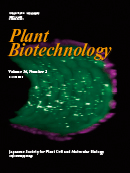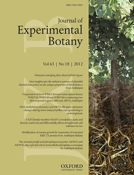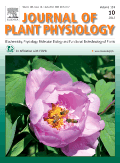
Plant Gene
Scope & Guideline
Advancing the Frontiers of Plant Genetics
Introduction
Aims and Scopes
- Genetic Diversity and Population Structure:
Research in this area explores the genetic variation within plant species and populations, employing molecular markers and phenotypic descriptors to assess diversity and inform breeding strategies. - Genome Editing and Biotechnology:
The journal publishes studies on cutting-edge genome editing techniques, such as CRISPR/Cas9, aimed at improving plant traits for stress tolerance and disease resistance. - Stress Responses and Adaptation Mechanisms:
A significant focus is placed on understanding how plants respond to biotic and abiotic stresses, including drought, salinity, and pathogens, through molecular and physiological adaptations. - Functional Genomics and Transcriptomics:
The exploration of gene expression profiles and functional analyses of various gene families using transcriptomic approaches is a core area, providing insights into gene roles in plant development and stress responses. - Plant-Microbe Interactions:
Research on the interactions between plants and their microbiomes, including beneficial endophytes and pathogens, is emphasized, highlighting the implications for plant health and productivity. - Molecular Breeding and Crop Improvement:
The journal covers innovative breeding strategies that combine traditional and molecular approaches to enhance crop yield, quality, and resilience to environmental stress.
Trending and Emerging
- Genome-Wide Association Studies (GWAS):
GWAS have gained traction as a powerful tool for identifying genetic loci associated with desirable traits, particularly in crops under stress conditions, reflecting a trend towards data-driven breeding approaches. - Omics Technologies Integration:
There is an increasing focus on integrating genomics, transcriptomics, proteomics, and metabolomics to provide a holistic understanding of plant responses and traits, enhancing breeding strategies. - Molecular Mechanisms of Stress Tolerance:
A growing body of research is dedicated to elucidating the molecular pathways and gene networks involved in stress tolerance, driven by climate change and the need for resilient crops. - MicroRNA and Epigenetic Regulation:
The roles of microRNAs and epigenetic factors in regulating plant development and stress responses are emerging as significant themes, underscoring the complexity of gene regulation in plants. - Biostimulants and Plant Growth Promoters:
Studies on the application of biostimulants and their mechanisms in enhancing plant growth and stress resilience are increasingly common, reflecting a trend towards sustainable agricultural practices.
Declining or Waning
- Traditional Breeding Techniques:
There is a noticeable decrease in publications focused solely on conventional breeding methods, as the field shifts towards integrating molecular and genomic technologies for plant improvement. - Basic Plant Physiology Studies:
Research centered on fundamental physiological aspects of plant growth and development has become less frequent, likely due to the growing emphasis on molecular and genetic approaches. - Pest and Disease Management Studies:
While still relevant, the frequency of studies specifically focusing on pest and disease management without a genetic or genomic angle is declining, as researchers increasingly seek molecular solutions.
Similar Journals

THEORETICAL AND APPLIED GENETICS
Connecting theoretical frameworks with practical solutions in genetics.THEORETICAL AND APPLIED GENETICS, published by Springer, is a premier journal that has significantly contributed to the fields of Agronomy, Crop Science, Biotechnology, and Genetics since its inception in 1933. With a solid reputation reflected in its Q1 ranking across multiple disciplines for 2023, this journal provides a vital platform for the dissemination of high-quality research that advances our understanding of genetic principles and their applications in agriculture and biology. The journal's indexed status and high impact factor indicate its vital role in shaping contemporary genetic research, marking it as an essential resource for researchers, professionals, and students seeking to stay at the forefront of these dynamic fields. Although it currently does not offer Open Access options, the journal ensures that quality studies are accessible through institutional subscriptions, supporting an informed community of scientists dedicated to innovation in genetics and applied biological sciences.

Tropical Plant Biology
Fostering Innovation in Plant Science and EcologyTropical Plant Biology is a premier academic journal published by Springer, dedicated to advancing the understanding of tropical plants and their ecological significance. With an ISSN of 1935-9756 and an E-ISSN of 1935-9764, this journal serves as a vital platform for researchers, professionals, and students focused on the fields of Genetics and Plant Science. Notably recognized in 2023 as a Q2 journal in Plant Science and Q3 in Genetics, it ranks 171st out of 516 in Agricultural and Biological Sciences and 227th out of 347 in Genetics according to Scopus. The journal encompasses a diverse range of topics, offering insights into tropical plant biology, ecology, conservation, and biodiversity. Although it does not currently operate under an open-access model, it remains an essential resource for anyone passionate about tropical ecosystems and their intricate relationships. With contributions spanning from 2009 to 2024, Tropical Plant Biology continues to foster scholarly discourse and innovation in the field.

SABRAO Journal of Breeding and Genetics
Innovating research for a sustainable agricultural future.SABRAO Journal of Breeding and Genetics is a premier academic platform dedicated to fostering research and dissemination in the fields of agronomy, animal science, biotechnology, and genetics. Published by the SOC ADVANCEMENT BREEDING RESEARCHES ASIA & OCEANIA in Japan, this esteemed journal has an ISSN of 1029-7073 and E-ISSN of 2224-8978. Operating under open access, it aims to enhance the visibility of high-quality research while encouraging innovative advancements in breeding and genetics studies. With remarkable quartile rankings in 2023, including Q3 in Agronomy and Crop Science and Biotechnology, the journal is an essential resource for researchers, professionals, and students aiming to stay informed about the latest scientific developments. Covering diverse topics in a converged timeline from 2008 to 2024, it offers a comprehensive outlook on the challenges and advancements shaping the future of agricultural and biological sciences.

Czech Journal of Genetics and Plant Breeding
Fostering collaboration in genetics and plant breeding.Czech Journal of Genetics and Plant Breeding is a premier academic journal dedicated to advancing the fields of genetics and plant science. Published by the esteemed Czech Academy Agricultural Sciences, this journal has been available as an Open Access resource since 2002, ensuring that essential research is freely accessible to a global audience. With an ISSN of 1212-1975 and an E-ISSN of 1805-9325, it continues to disseminate high-quality studies and findings from the vibrant scientific community in the Czech Republic and beyond. The journal operates within the Scopus ranks, securing 279th place in the category of Plant Science and 282nd in Genetics, reflecting its commitment to scholarly rigor. The Journal's objectives focus on exploring innovations in genetic research and plant breeding methodologies, offering valuable insights that foster collaboration among researchers, professionals, and students alike. As the journal converges from 2007 to 2024, it remains a vital publication for those seeking to stay abreast of developments in genetic diversity, crop improvement, and sustainable agriculture practices.

MOLECULAR BREEDING
Pioneering Research in Plant Science and BiotechnologyMOLECULAR BREEDING is a prestigious journal published by Springer, dedicated to advancing the field of agronomy, plant science, and biotechnology through innovative research contributions. With an impressive ISSN of 1380-3743 and E-ISSN 1572-9788, this journal has continuously served the scientific community since its inception in 1995. Operating from the Netherlands, MOLECULAR BREEDING is recognized for its high impact factor and status in the Q1 quartile for both Agronomy and Crop Science and Plant Science in the latest 2023 metrics, highlighting its influential role in these domains. With strong Scopus rankings reflecting its position within the top percentiles of various related fields—including a notable 81st percentile in Plant Science—this journal is essential for researchers, professionals, and students striving to understand and innovate in molecular genetics and breeding techniques. Although it does not provide open access, its rigorous peer-review process ensures that published articles maintain the highest standards and contribute significantly to the scientific discourse. The journal’s diverse scope encompasses significant advancements in molecular biology and genetics, ultimately supporting the global objectives of sustainable agriculture and enhanced crop resilience.

BOTANICAL REVIEW
Elevating ecological perspectives in botanical studies.BOTANICAL REVIEW is a highly esteemed journal published by SPRINGER, renowned for its commitment to advancing the fields of Ecology, Evolution, Behavior and Systematics and Plant Science. Established in 1935, this journal has become a cornerstone for researchers and professionals, reflecting over eight decades of rigorous scholarship. With an impressive impact factor and ranking within the top quartile for both its fields—Q1 in Ecology, Evolution, Behavior and Systematics and Plant Science—BOTANICAL REVIEW remains a key platform for disseminating critical findings and fostering scientific dialogue. Although it is not an open-access journal, its accessibility through institutional subscriptions enhances its reach among the academic community. The journal not only emphasizes the ecological aspects of plant life but also integrates evolutionary context to inform current practices and theories in botany. With a dedication to exploring the complex interactions within botanical sciences, BOTANICAL REVIEW continues to shape the future of plant research.

Plant Biotechnology
Cultivating Insights for a Greener Future.Plant Biotechnology is a distinguished journal published by the Japanese Society for Plant Cell and Molecular Biology, committed to advancing the field of plant biotechnology through the dissemination of high-quality research. With an ISSN of 1342-4580, this journal caters to a global audience interested in agronomy, crop science, and plant molecular biology. The journal has achieved notable rankings, including Q2 in Agronomy and Crop Science and Q2 in Plant Science, underscoring its relevance and impact in these fields according to the latest 2023 metrics. Furthermore, it holds a respectable position within Scopus rankings across multiple categories, indicating its contribution to the academic community. Although it is not an open-access journal, its regular publications, spanning from 1997 to 2024, feature cutting-edge studies that explore innovative approaches and technologies in plant science. Researchers, professionals, and students will find Plant Biotechnology an essential resource for staying informed on significant advancements and trends in plant research.

JOURNAL OF EXPERIMENTAL BOTANY
Exploring the intricate world of plant functions.JOURNAL OF EXPERIMENTAL BOTANY, published by Oxford University Press, stands as a premier journal for researchers and professionals in the fields of plant science and physiology. With an illustrious history dating back to 1950, this journal has established itself as a critical resource for advancing our understanding of plant biology and its applications. It is recognized in the top tier of academic publishing, reflected in its Q1 rankings in both Plant Science and Physiology for 2023, and boasts impressive Scopus rankings—placing it in the 96th and 91st percentiles of its respective categories. Though not an open-access journal, it ensures widespread access to groundbreaking research aimed at unraveling the complexities of plant functions and adaptations. As we look toward 2024, the JOURNAL OF EXPERIMENTAL BOTANY continues to play an essential role in fostering innovation, collaboration, and education within this vital area of science.

INDIAN JOURNAL OF GENETICS AND PLANT BREEDING
Bridging Science and Agriculture for Global ImpactIndian Journal of Genetics and Plant Breeding, ISSN 0019-5200, published by the Indian Society of Genetics and Plant Breeding, serves as a pivotal platform for research in the fields of genetics and plant breeding. Based in India, this journal provides valuable insights into the latest developments, methodologies, and findings that drive innovation and enhance the agricultural landscape. With a convergence period extending from 2008 to 2024, this journal maintains a strong focus on advancing our understanding of genetic mechanisms in plants, contributing significantly to both academic circles and practical applications in agriculture. Although presently ranked in the fourth quartile for Genetics and the third quartile for Plant Science, the journal aims to elevate its impact factor and enhance visibility among research communities through rigorous peer-reviewed articles. Published in both print and online formats, the journal is accessible to a global audience and emphasizes the importance of open communication in fostering scientific advancements. Researchers, professionals, and students alike will find this journal an essential resource for staying abreast of trends and breakthroughs in genetic research and plant breeding.

JOURNAL OF PLANT PHYSIOLOGY
Shaping Tomorrow's Agronomy TodayJOURNAL OF PLANT PHYSIOLOGY, published by ELSEVIER GMBH, stands as a leading international journal dedicated to the field of plant physiology, agronomy, and crop science. With an impressive impact factor and recognition within the Q1 and Q2 quartiles across various categories, this journal consistently ranks among the top in its field—positioned at #65/516 in Plant Science and #52/406 in Agronomy and Crop Science as of 2023. Located in Munich, Germany, it serves as a vital platform for researchers, practitioners, and students to share groundbreaking insights and advancements. Although it does not currently offer open access, the journal provides an essential repository of knowledge, publishing significant original research, reviews, and discussions on plant function, regulation, and development, thereby shaping the future of agricultural practices and contributing to our understanding of biophysical processes. Researchers looking to publish in a reputable venue or to access cutting-edge studies will find JOURNAL OF PLANT PHYSIOLOGY an invaluable resource.